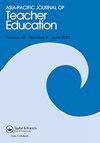Preservice mathematics teachers’ reasoning about their instructional design for using technology to teach mathematics
IF 1.6
3区 教育学
Q2 EDUCATION & EDUCATIONAL RESEARCH
引用次数: 0
Abstract
ABSTRACT This study explored mathematics teachers’ reasoning regarding their instructional design for technology use in teaching mathematics. Various types of qualitative data were obtained and analysed from a sample of 19 secondary and 28 primary preservice teachers. The findings showed that the purposes of technology use, teachers’ conceptions of mathematics and its learning, their learning experience and knowledge of student thinking as well as mathematical cognition, and empirical inquiry were the main sources of teacher reasoning. Three levels of teacher reasoning were identified: descriptive, explanatory, and justifying. Our findings contributed to research on teacher professional development by identifying four types of technology use with a variety of pedagogical purposes, and formulating two main dimensions to characterise the three levels of teacher reasoning.保留数学教师对利用技术教授数学的教学设计的推理
摘要本研究探讨了数学教师在数学教学中使用技术的教学设计推理。从19名中学教师和28名小学职前教师的样本中获得各种类型的定性数据并进行分析。研究发现,技术使用的目的、教师对数学及其学习的概念、教师的学习经验和对学生思维和数学认知的认识以及实证探究是教师推理的主要来源。教师推理分为三个层次:描述性、解释性和正当性。我们的发现有助于教师专业发展的研究,通过确定具有各种教学目的的四种技术使用类型,并制定两个主要维度来表征教师推理的三个层次。
本文章由计算机程序翻译,如有差异,请以英文原文为准。
求助全文
约1分钟内获得全文
求助全文
来源期刊

Asia-Pacific Journal of Teacher Education
EDUCATION & EDUCATIONAL RESEARCH-
CiteScore
4.40
自引率
7.70%
发文量
29
期刊介绍:
This journal promotes rigorous research that makes a significant contribution to advancing knowledge in teacher education across early childhood, primary, secondary, vocational education and training, and higher education. The journal editors invite for peer review theoretically informed papers - including, but not limited to, empirically grounded research - which focus on significant issues relevant to an international audience in regards to: Teacher education (including initial teacher education and ongoing professional education) of teachers internationally; The cultural, economic, political, social and/or technological dimensions and contexts of teacher education; Change, stability, reform and resistance in (and relating to) teacher education; Improving the quality and impact of research in teacher education.
 求助内容:
求助内容: 应助结果提醒方式:
应助结果提醒方式:


